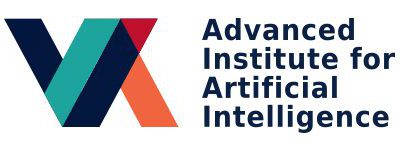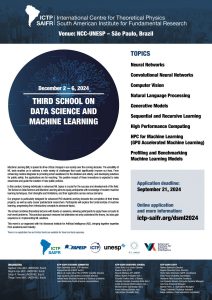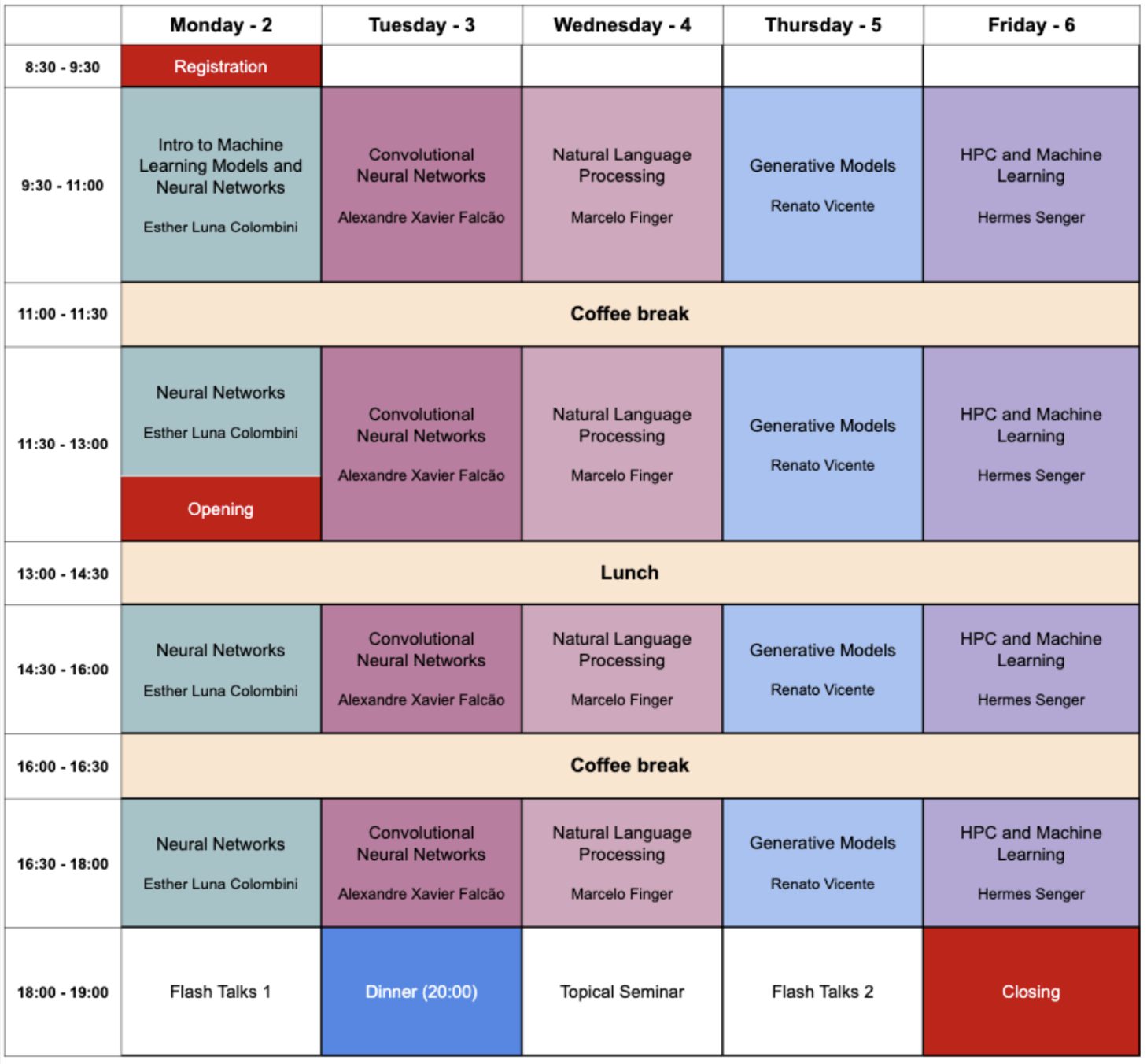Third School on Data Science and Machine Learning


December 2-6, 2024
ICTP-SAIFR, São Paulo, Brazil
Venue: NCC-UNESP
Zoom
847 4807 1349
learning
Home
Machine Learning (ML) is poised to drive critical changes in our society over the coming decades. The versatility of ML tools enables us to address a wide variety of challenges that could significantly improve our lives. From enhancing medical diagnosis to providing smart assistance for the disabled and elderly, and developing solutions for public safety, the applications are far-reaching. The positive impact of these innovations is expected to raise awareness and guide the creation of new public policies.
In this context, training individuals in advanced ML topics is crucial for the success and development of the field. The School on Data Science and Machine Learning aims to equip participants with knowledge of modern machine learning techniques, their strengths and limitations, and their application across various domains.
Our program is particularly designed for advanced PhD students working towards the completion of their thesis projects, as well as early-career postdoctoral researchers. Participants will explore the fundamentals of machine learning, progressing from introductory concepts to advanced topics including:
• Neural Networks
• Convolutional Neural Networks
• Computer Vision
• Natural Language Processing
• Generative Models
• Sequential and Recursive Learning
• High Performance Computing
• HPC for Machine Learning (GPU Accelerated Training)
• Profiling and Benchmarking Machine Learning Models
The school combines theoretical lectures with hands-on sessions, allowing participants to apply these concepts to real-world problems. This practical approach ensures that attendees not only understand the theory, but also gain experience in implementing ML solutions.
This event is co-organized with the Advanced Institute for Artificial Intelligence (AI2), bringing together expertise from academia and industry. We would like to express our gratitude to NVIDIA for providing the training on their platform for AI education.
There is no registration fee and limited funds are available for travel and local expenses.
Organizers:
- Raphael Cobe (NCC-UNESP/AI2, Brazil)
- Rogério Iope (NCC-UNESP/AI2, Brazil)
- Sergio F. Novaes (UNESP/AI2, Brazil)
- Thiago Tomei (NCC-UNESP/AI2, Brazil)
List of participants: Updated on December 05, 2024.
Survey: Here
Lectures
Topics:
• Neural Networks
• Convolutional Neural Networks
• Computer Vision
• Natural Language Processing
• Generative Models
• Sequential and Recursive Learning
• High Performance Computing
• HPC for Machine Learning (GPU Accelerated Training)
• Profiling and Benchmarking Machine Learning Models
Lecturers:
- Esther Colombini (UNICAMP. Brazil)
- Alexandre Falcão (UNICAMP. Brazil)
- Marcelo Finger (IME-USP, Brazil)
- Hermes Senger (UFSCar, Brazil)
- Renato Vicente (IME-USP, Brazil)
Registration
Program
Posters
- Ailton José Rodrigues (Informatic Center [CIn] of the Federal University of Pernambuco [UFPE], Brazil): V-Librasil : A New Dataset with Signs in Brazilian Sign Language (Libras)
- Aline Andrade do Nascimento (Brazilian National Instituto of Space Research, Brazil): Estimation of Net Carbon Exchange at the K77 Tower in Santarém (Brazil) Using Machine Learning Techniques
- Amancio Henrique Damasceno Rodrigues (Unicamp, Brazil): Utilizing WEKA and Figshare Data for Machine Learning-Based Predictive Analysis of Falls in the Elderly
- Ana Paula Jeakel Dias (Universidade Federal do Espírito Santo, Brazil): Star and Galaxy Classification in J-NEP Using MiniJPAS Data
- Artur José Marques Paulo (Hospital Israelita Albert Einstein, Brazil): Enhancing Chronological Age Prediction in Head CT scans Through Skull Information Integration
- Carlos Leon (Institute of Physics – Federal Fluminense university UFF . NITEROI RJ, Brazil): Machine Learning for Shape Memory Graphene Nanoribbons
- Gabriela Voloini Soffiati (Ifusp, Brazil): Theoretical Studies. Based on Density Functional Theory, of Elementary Processes in Fuel Cells and Electrolyzers
- GLEICE GERMANO (Instituto de Pesquisas Energéticas e Nucleares, Brazil): Rapid identification of breast cancer in different stages using micro-FTIR
- Isabel de Castro Beneyto (Universidade Federal do Ceará/Hotmart, Brazil): Similarity-based Kaplan-Meier estimator
- Iyinoluwa Moyosola Oyelade (Federal University of Technology, Akure, Nigeria): Animal Intrusion Detection Using an Ensemble of Deep Convolutional Neural Networks for improved Feature Extraction
- Juan Jose Molina Mejia (Pontificia Universidad Católica de Chile, Chile): Understanding the dynamics of the frequency bias in neural networks
- Karen Nowogrodzki (Universidad Nacional de San Martín – ICAS – ICIFI, Argentina): Classifying light curves to detect microlensing events with machine learning for the Vera Rubin LSST
- Leticia da Silva Bomfim (Centro de Estudos de Petróleo – CEPETRO, Brazil): Seismic Facies Analysis in Reservoir Characterization: Deep Learning Approach for Robust Classification and Data Refinement
- Luiza Lober de Souza Piva (Universidade de São Paulo (USP), Brazil): Predictive chaotic dynamics via neural networks and recurrence plots
- Miriam Mathias Gigi (Universidade de São Paulo, Brazil): Investigation of the Variation of Gamma Radiation in Meaípe with a Neural Network.
- Pablo Sotomayor (National University of La Plata, Argentina): Muon counting in Auger Prime with machine learning techniques
- Sergio Henrique Andrade de Azevedo (Universidade Estadual de Campinas, Brazil): Efficient and scalable posteior sampling for multivariate spatial models
- Thales Alves de Melo Fernandes (Butantan Institute, Brazil): Structural Modeling of Bothrops jararaca Oligosaccharyltransferase Complexes via Deep Learning
- Tiago de Souza Farias (Universidade Federal de São Carlos, Brazil): Approximating the Solution of Differential Equations with Neural Networks
- Wilton Moreira de Santana Júnior (Instituto Federal de Ciência e Tecnologia do Piauí – IFPI, Brazil): Unlocking the Power of Data Science for Social Impact
Abstracts: here
Videos and Files
-
09:30 - Esther Colombini (UNICAMP. Brazil):
Intro to Machine Learning Models and Neural Networks - Class 1
-
11:30 - Esther Colombini (UNICAMP. Brazil):
Neural Networks - Class 2
-
14:30 - Esther Colombini (UNICAMP. Brazil):
Neural Networks - Class 3
-
16:30 - Esther Colombini (UNICAMP. Brazil):
Neural Networks - Class 4
-
09:30 - Alexandre Falcão (UNICAMP. Brazil):
Convolutional Neural Networks - Class 1
-
11:30 - Alexandre Falcão (UNICAMP. Brazil):
Convolutional Neural Networks - Class 2
-
14:30 - Alexandre Falcão (UNICAMP. Brazil):
Convolutional Neural Networks - Class 3
-
16:30 - Alexandre Falcão (UNICAMP. Brazil):
Convolutional Neural Networks - Class 4
-
09:30 - Marcelo Finger (IME-USP, Brazil):
Natural Language Processing - Class 1
-
11:30 - Marcelo Finger (IME-USP, Brazil):
Natural Language Processing - Class 2
-
14:30 - Marcelo Finger (IME-USP, Brazil):
Natural Language Processing - Class 3
-
16:30 - Marcelo Finger (IME-USP, Brazil):
Natural Language Processing - Class 4
-
09:30 - Renato Vicente (IME-USP, Brazil):
Generative Models - Class 1
-
11:30 - Renato Vicente (IME-USP, Brazil):
Generative Models - Class 2
-
14:30 - Renato Vicente (IME-USP, Brazil):
Generative Models - Class 3
-
16:30 - Renato Vicente (IME-USP, Brazil):
Generative Models - Class 4
-
09:30 - Hermes Senger (UFSCar, Brazil):
HPC and Machine Learning - Class 1
-
11:30 - Hermes Senger (UFSCar, Brazil):
HPC and Machine Learning - Class 2
-
14:30 - Hermes Senger (UFSCar, Brazil):
HPC and Machine Learning - Class 3
-
16:30 - Hermes Senger (UFSCar, Brazil):
HPC and Machine Learning - Class 4
asdasdasd
Photos
Additional Information
Attention! Some participants in ICTP-SAIFR activities have received email from fake travel agencies asking for credit card information. All communication with participants will be made by ICTP-SAIFR staff using an e-mail “@ictp-saifr.org”. We will not send any mailings about accommodation that require a credit card number or any sort of deposit.
BOARDING PASS: All participants, whose travel has been provided or will be reimbursed by ICTP-SAIFR, should bring the boarding pass upon registration. The return boarding pass (PDF, if online check-in, scan or picture, if physical) should be sent to secretary@ictp-saifr.org by e-mail.
COVID-19: Brazilians and foreigners no longer have to present proof of vaccination before entering the country.
Visa information: Nationals from several countries in Latin America and Europe are exempt from tourist visa. Nationals from Australia, Canada and USA are exempt from tourist visa until April 10, 2025. Please check here which nationals need a tourist visa to enter Brazil.
Accommodation: Participants, whose accommodation will be provided by the institute, will stay at The Universe Flat. Hotel recommendations are available here.
How to reach the Institute: The first week of the school will be held at ICTP South American Institute, located at IFT-UNESP, which is across the street from a major bus and subway terminal (Terminal Barra Funda). The address which is closer to the entrance of the IFT-UNESP building is R. Jornalista Aloysio Biondi, 120 – Barra Funda, São Paulo. The easiest way to reach us is by subway or bus, please find instructions here.
Poster presentation: Participants who are presenting a poster MUST BRING A PRINTED BANNER . The banner size should be at most 1 m (width) x 1,5 m (length). We do not accept A4 or A3 paper


